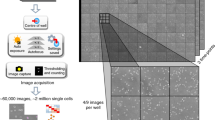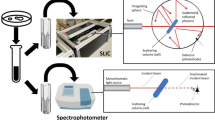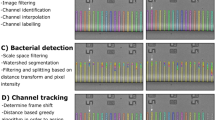Abstract
I HAVE already discussed the feasibility of identifying living bacterial cells using differential light scattering techniques1. I suggested that, because there are subtle structural and biochemical differences between bacterial species, average differences should be expected in their dielectric composition. Thus the light scattering characteristics of one species might well differ from those of another species. Light scattering characteristics could therefore serve as a means of identification. Naturally, variations in size and shape, growth history and environmental effects on cellular morphology would be expected to modify light scattering differences and perhaps render such an identification procedure meaningless.
This is a preview of subscription content, access via your institution
Access options
Subscribe to this journal
Receive 51 print issues and online access
$199.00 per year
only $3.90 per issue
Buy this article
- Purchase on Springer Link
- Instant access to full article PDF
Prices may be subject to local taxes which are calculated during checkout
Similar content being viewed by others
References
Wyatt, P. J., Appl. Optics, 7, 1879 (1968).
Kratohvil, J. P., and Smart, C., J. Colloid Sci., 20, 875 (1965).
Author information
Authors and Affiliations
Rights and permissions
About this article
Cite this article
WYATT, P. Identification of Bacteria by Differential Light Scattering. Nature 221, 1257–1258 (1969). https://doi.org/10.1038/2211257a0
Received:
Revised:
Published:
Issue Date:
DOI: https://doi.org/10.1038/2211257a0
This article is cited by
-
Synthetic algal-bacteria consortia for space-efficient microalgal growth in a simple hydrogel system
Journal of Applied Phycology (2021)
-
Digital imaging information technology for biospeckle activity assessment relative to bacteria and parasites
Lasers in Medical Science (2017)
-
Angle-resolved light scattering of individual rod-shaped bacteria based on Fourier transform light scattering
Scientific Reports (2014)
-
The UnimasTM detector: A near-universal interface between HPLC and GC
Chromatographia (2001)
-
Cell Wall Thickness, Size Distribution, Refractive Index Ratio and Dry Weight Content of Living Bacteria (Stapylococcus aureus)
Nature (1970)
Comments
By submitting a comment you agree to abide by our Terms and Community Guidelines. If you find something abusive or that does not comply with our terms or guidelines please flag it as inappropriate.



